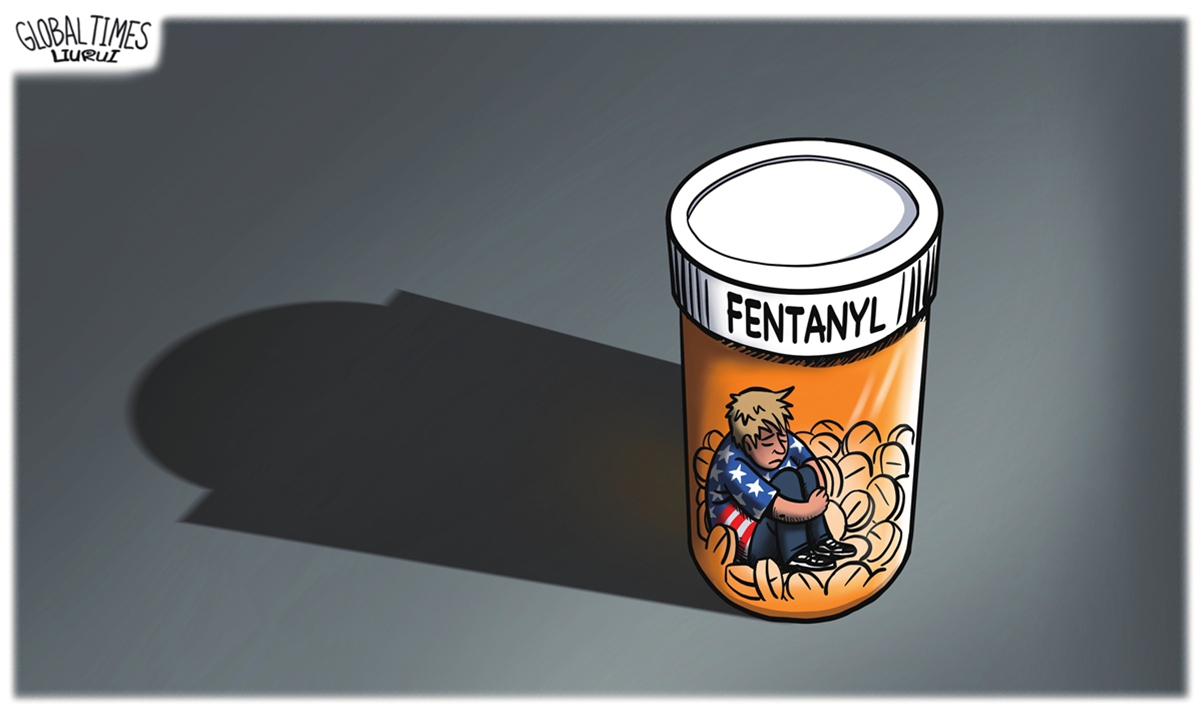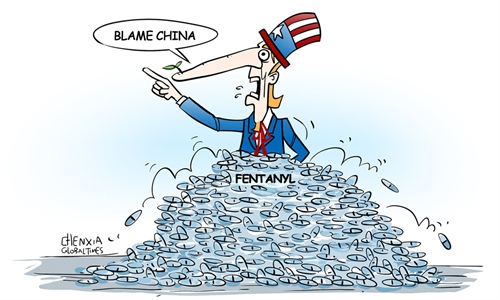
Illustration:Liu Rui/GT
Editor's Note:China has carried out extensive and in-depth counternarcotics cooperation with the US. However, despite this fact, the US has blamed China for the prevalence of fentanyl on US soil, a move that undermines China's goodwill and the cooperative atmosphere between the two countries. How should the US view its own crisis? What efforts has China made in the anti-drug fight? The Global Times collects opinions from Chinese and American scholars to discuss this issue. This is the second installment of the series.
Recently, US President-elect Donald Trump announced that he would impose an additional 10 percent tariff on all Chinese imported goods on the grounds that China has not taken strong enough actions to prevent the flow of fentanyl into the US through Mexico. The US' rhetoric is full of loopholes and can hardly be justified.
First, the US side ignores the facts. From the perspective of the intensity of China's anti-drug fight and China-US cooperation, China has always adhered to high standards and strict requirements on anti-drug issues. It is the first country in the world to place all potential fentanyl variants on the controlled substances list. Second, the US deliberately confuses the concept. One of the important reasons for the surge in fentanyl fatalities in the US in recent years is that underground workshops mix and sell black tar heroin, which swept across the western US many years ago, or powdered heroin, which has taken over the underground drug market in the east, with fentanyl.
Therefore, the US hyping up the overseas import of fentanyl precursors in order to cover up its own regulatory and governance failures is nothing more than an attempt to evade its own guilt and put the blame on others, which will not help resolve the domestic crisis at all.
Third, the US has an ulterior motive. Turning the fentanyl issue into a "diplomatic tool" and fully "weaponizing" it has gradually become a common practice of anti-China politicians in the US. In April 2024, the Select Committee on the Strategic Competition Between the United States and the Chinese Communist Party released the report "The CCP's Role in the Fentanyl Crisis," which accused the Chinese government of "directly subsidizing the manufacturing and export of illicit fentanyl materials and other synthetic narcotics through tax rebates" and "failing to prosecute fentanyl and precursor manufacturers." The "weaponization" of fentanyl may become one of the steps for the incoming US administration to contain China.
"Weaponizing" drugs such as fentanyl is a common tactic used by the US to intervene in the affairs of foreign countries and disturb its competitors. The US can be, more or less, seen as the main instigator of events such as the rise of the "Golden Crescent" drug belt in Afghanistan, the "Cocaine Coup" in Bolivia in 1980, and drug trafficking in the 1984 coup in Nicaragua.
The US distorts the facts and ignores the existing efforts and results of China-US anti-drug cooperation. The US rhetoric is unacceptable.
It is the ordinary Americans who are forced to pay for this in the first place. Fentanyl abuse has not only become a major cause of death for Americans aged 18 to 45. In this regard, the draft of the US National Defense Authorization Act for Fiscal Year 2025 includes a section to prevent military branches from testing recruits for marijuana as a condition of enlistment.
Wielding the tariff stick under the pretext of the fentanyl issue may trigger an increase in domestic prices, greatly intensify the risk of a trade war, and weaken the enthusiasm of countries subject to increased tariffs to share intelligence and engage in joint operations with US law enforcement agencies in anti-drugs efforts. It will also undermine an international cooperation network to jointly combat transnational drug trafficking.
The author is an associate research fellow at the Institute of American Studies of the Chinese Academy of Social Sciences. opinion@globaltimes.com.cn

